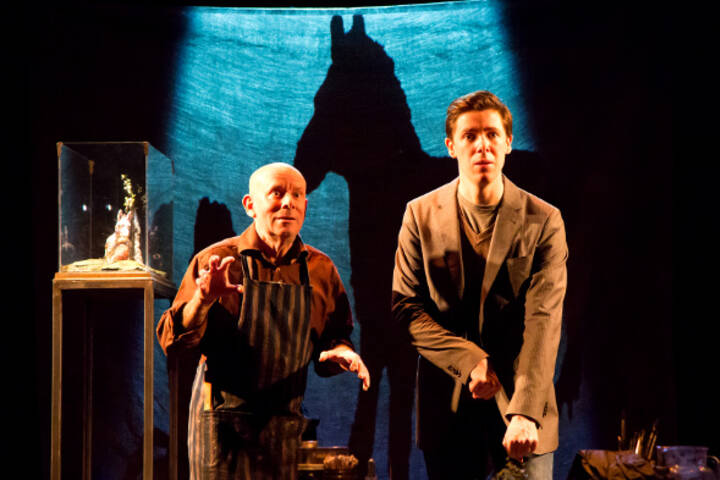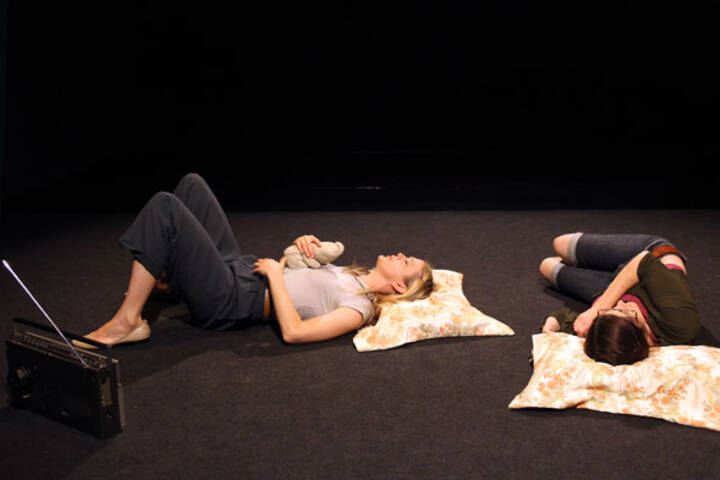
Thursday Theatre Review: Alias Godot
Often when I go review a play, somebody spots my notebook and figures out that I'm a critic. Sometimes they'll make a comment about it. Last night at Tarragon Theatre's premiere of Alias Godot, the woman sitting next to me said this:
"I hope when I read your review I'll know what this play is about."
I smiled, I laughed, I made some low-cal statement about confusion following Beckett around like a puppy. But then I thought to myself, "geez, I hope when I actually write this review, I know what this play is about."
Here's the good news: after sleeping on it, I think I've got a handle on playwright Brendan Gall's intriguing and entertaining play. The bad news is that I'm not entirely sure what it's trying to accomplish.
Alias Godot is a re-work of Samuel Beckett's timeless mystery of a play, Waiting for a Godot. In one sense, it tells the other side of the story- why Godot failed to meet Vladimir and Estragon in an empty field at the appointed time. In another, Alias Godot is an attempt to map the characters, relationships and various existential quandaries of the original into a modern, post-9/11 reality. This is a monumental task, particularly since there is no broad agreement about what Waiting For Godot was about in the first place. Gall seems eager to nail down at least a portion of this ambiguity, a task at which he is largely unsuccessful.
No question, this is an immensely clever and funny script. Gall's dialogue snaps and lurches across the stage, full of one-liners and complex turns of phrase. The play is somewhere between Beckett's original text and a Quentin Tarantino movie, playfully challenging the audience to try and keep up with the action. Occasionally, Gall slips into cliche and goes for the easy line, playing the subtext a bit on the nose. Still, it is an impressive piece of theatre, demonstrating both Gall's expansive interests as an artist and his genuine desire to entertain the audience.
Gall's words are well served by an impressive cast. Everyone turns in an exceptional performance, from Alon Nashman's sad-eyed Godot to the frenetic clowning of Tony Nappo's Rocko. Nappo's lunacy is particularly effective, as it underscores one of the play's more salient political points- namely, fifty years of absurdist theatre has nothing on the War on Terror. Geoffrey Pounsett deserves special mention for a virtuoso delivery of a spectacularly composed monologue in the first act. I won't give too much away, but its pretty darn fantastic.
However, I was a bit disappointed with David Ferry's portrayal of Vincent. For an actor who can bring so much depth and detail to his roles, he chose to play his character in broad strokes. He's still very, very good (David Ferry off his game is still better than the vast majority of actors in Toronto), but I was hoping for a little more.
Unfortunately, a sparky, clever script and excellent cast can't conceal the crisis of purpose at the heart of Alias Godot. This is a play that doesn't really know what it's trying to do Is it a riff on Beckett's original? An attempt to update the themes for the 21st century? A rumination on the nature of God? It is, in fact, all of these things at various times, and none of these missions drive home to a meaningful resolution. I puzzled over this at length, and suspect this lack of purpose can be attributed to two things. First, none of the character seem to go anywhere. Their end up in more or less exactly the same place we found them in. "But Graeme," you might say, "the same thing can be said for the original Waiting For Godot." True. But the crucial difference is that Vladimir and Estragon walk in a giant narrative circle before returning to their beginning states, underscoring Beckett's essential thrust that human existence is fundamentally meaningless. For that point to resonate, there needs to be some kind of journey. In Alias Godot, that journey never seems to get started.
The other problem is that there is a profound act of naming that goes on in Gall's script. Then enduring appeal of Beckett's script is deciphering the riddle at its core. Is Godot god? Life itself? Just some guy? But Gall nails it down in no uncertain terms, in an almost ham-fisted way. Godot is God. In the a series of preview articles, both Gall and the journalists who interviewed him remark on the 'existential' nature of the play. But Alias Godot is not existential. It is metaphysical. By giving Godot a face, a voice, and a (somewhat) divine identity, Gall has written a show that attempts to make some statement about the nature of god, and man's murder of this divinity, pace Nietzsche. It's a fuzzy message made problematic by its position in the script, and the way in which Gall chooses to resolve it. Personally, I find the hopelessness of Beckett to be much more intellectually interesting and much more effective as a motivating idea.
But you should still go see it. As the previous two paragraphs of pseudo-philosophy illustrate, this play made me think. Really hard. About really abstract things. And, it made me laugh. Gall's thematic project may be a bit of a fiasco, but he's done something fairly rare in the Toronto theatre scene- simultaneously provoke and entertain. If that isn't worth the ticket price, then I don't know what is.
Alias Godot continues at the Tarragon Theatre until June 1st. For tickets and information, call 416 531 1827 or visit tickets.tarragontheatre.com.
Photo: Alon Nashman, David Ferry, Paul Braunstein, Tony Nappo, and Geoffrey Pounsett get metaphysical. By Cylla von Tiedemann.
Latest Videos
Latest Videos
Join the conversation Load comments







